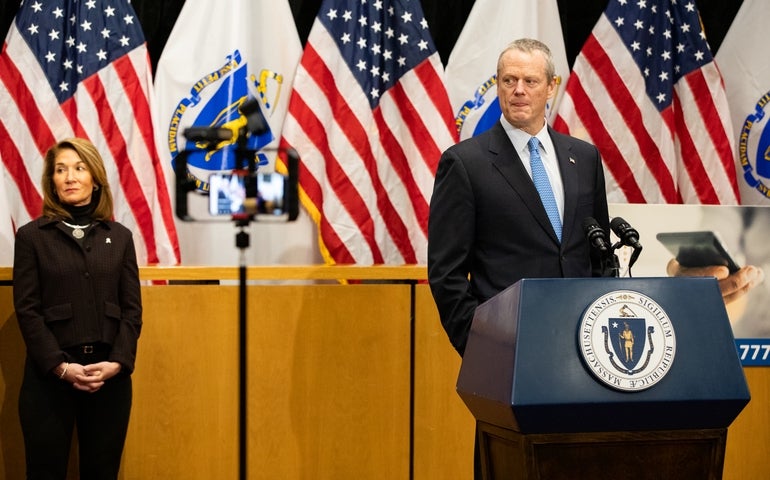One of Gov. Charlie Baker’s former employers on Wednesday backed half of his proposal to begin collecting sales taxes from certain companies in real-time, or at least on an accelerated basis, but suggested that the Legislature should scale back the second half of Baker’s proposal.
The Pioneer Institute issued a policy brief Wednesday analyzing the two-phase sales tax modernization plan that Baker included in the fiscal year 2021 budget he filed in January to pull in $237 million in one-time revenue for the state.
As state tax revenues crater during the COVID-19 pandemic, Pioneer said the governor’s plan “could get money into state coffers more quickly” and allow the state to “collect much-needed interest on the funds.”
“Before the pandemic, the sales tax accounted for approximately 23 percent of Massachusetts’ total annual tax revenue, but the decline in retail sales over the past 10 weeks has created a crisis for state leaders here and in other sales tax-dependent states across the country,” report authors Greg Sullivan, a former state inspector general, and Andrew Mikula wrote.
Currently, sales taxes paid by consumers at the point of sale are held by businesses and remitted to the state on a monthly basis by the 20th day of the month following the month the taxes were collected.
Under the first phase of Baker’s proposal, which is similar to a plan the administration has previously attempted to get the Legislature to adopt, the largest 10 percent of businesses — those with at least $100,000 in sales or room occupancy and meals tax collections — would be required to remit taxes from the first three weeks of each month in the final week of that same month.
The final week’s remittance and reconciliation of any discrepancy would take place the following month.
The administration said that phase would affect only 10 percent of businesses, but account for 80 percent of sales tax revenue.
“Phase one of Governor Baker’s proposal, for advance payment, makes sense and is entirely feasible,” Sullivan and Mikula wrote. They added, “Advancements in electronic data processing and electronic fund transfers have obviated the need for protracted remittance timetables, especially for high-volume retailers that would be impacted by the advance payment regulations since virtually all of them employ modern automated technology. Currently, Massachusetts law under (M.G.L. c. 62C, §5) requires that businesses with sales/use tax liabilities file returns and make payments electronically. Therefore, the proposed acceleration of the remittance schedule does not create a technological challenge.”
When Baker announced his sales tax modernization plan in January, the Massachusetts Taxpayers Foundation said its members supported phase one, but had concerns about the feasibility of phase two, which would take effect in mid-2023 and require “all retailers and credit card processors [to] capture sales tax from electronic transactions at the moment of purchase and remit daily,” Secretary of Administration and Finance Michael Heffernan said in January.
“I think this second phase where it’s a daily remittance is a whole other ball of wax,” MTF President Eileen McAnneny said at the time. “We know, certainly, from a large part of our membership that there are significant concerns about the complexity of it, the compliance cost and the fact that Massachusetts would be the only state to have such a collection process.”
Sullivan and Mikula came to a similar conclusion, writing that they heard from opponents of real-time sales tax remittance about issues “pertaining to potential undue hardship and expense that would be placed on small and medium-sized local retailers.”
Instead of embracing the governor’s plan as presented, the Pioneer Institute suggested that the Legislature should instead adopt a scaled-down approach that would apply the second phase only to sellers conducting annual sales of $10 million or more.
“Advocates of the governor’s plan argue that opponents’ claims are greatly exaggerated about the technical difficulty and expense of implementing real-time sales tax collection. Advocates have presented results of two pilot tests of the governor’s proposal that they say demonstrate that opponents’ claims are unfounded,” Sullivan and Mikula wrote. “One way to find out whether the governor’s proposal would work without placing a potential hardship on local small and medium-sized sellers is to implement it only on high-volume internet sellers and market facilitators.”
The fate of the governor’s proposal is unknown, especially since the fiscal year 2021 budget process went off the rails in March when COVID-19 took hold. The House and Senate would typically be ironing out the difference between their budget bills in June. Instead, neither branch has surfaced a budget plan and the House Ways and Means Committee has until the July 1 start of the new fiscal year to produce a proposal.
In January, Baker acknowledged that lawmakers had been cool to the idea of sales tax modernization before, but said it is “impossible to imagine” that the state won’t eventually have real-time sales tax collection.
“Sometimes issues like this take a few trips to the plate to get discussed, vetted, debated before they get enacted,” he said.

